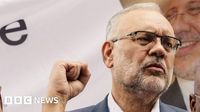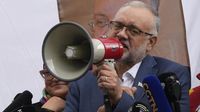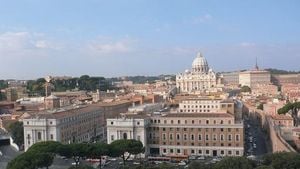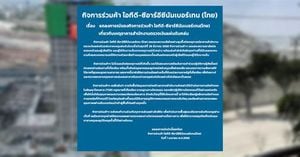CAPE TOWN, South Africa (AP) — Ebrahim Rasool, the South African ambassador expelled from the United States, returned home on March 23, 2025, to a raucous celebration at Cape Town International Airport. Thousands of supporters gathered to welcome him, with enthusiastic crowds surrounding him and chanting praises, marking a significant moment in his tumultuous diplomatic career.
Upon his arrival, Rasool addressed the supporters with a megaphone, stating, "A declaration of persona non grata is meant to humiliate you. But when you return to crowds like this, and with warmth ... like this, then I will wear my persona non grata as a badge of dignity." The expulsion, which was a striking move by the U.S., came on the heels of comments he made regarding shifts in the political landscape and demographics of the United States, which he cited during a webinar hosted by a South African think tank.
The conflict began when U.S. Secretary of State Marco Rubio labeled Rasool a "race-baiting politician" who harbors animosity towards America. This was in connection with Rasool’s statement that the Trump administration was "mobilising a supremacism" amid concerns that the white population in the U.S. could soon become a minority. His remarks struck a nerve, especially considering the political climate in the U.S., which has seen a surge in discussions around race and identity.
Rasool's comments came as tensions between South Africa and the U.S. worsened following Trump's presidency. In January, South African President Cyril Ramaphosa enacted legislation allowing the government to seize land without compensation—a move that was viewed unfavorably in Washington and elicited fears of racial discrimination against white Afrikaners, descendants of Dutch settlers. In response, the executive order from the Trump administration cut all funding to South Africa, alleging support for Hamas and Iran, alongside claims of pursuing anti-white policies.
"We don't come here to say we are anti-American," Rasool emphasized at the airport. "We are not here to call on you to throw away our interests with the United States." His return underscored not just his resilience but a broader issue regarding the relationship between the southern African nation and the U.S.
As Rasool stood before the crowd, many waved Palestinian flags and chanted slogans of solidarity, expressing their support for the Palestinian cause while also reaffirming the need for a principled stance against Israeli policies. He noted, "As we stand here, the bombing (in Gaza) has continued, and the shooting has continued. If South Africa was not in the (International Court of Justice), Israel would not be exposed, and the Palestinians would have no hope. We cannot sacrifice the Palestinians ... but we will also not give up our relationship with the United States."
This mixture of fervent support and complex political dynamics cannot be understated as Rasool spoke. The gathering included members of various South African organizations, such as the African National Congress and the South African Communist Party, all celebrating not just his return but a reaffirmed commitment to South Africa’s stance on international relations.
Rasool's previous experience as the U.S. ambassador from 2010 to 2015 under Obama adds further context to his recent expulsion. In this capacity, he forged significant connections in Washington that would have positioned him well for diplomatic discussions. His return marks a rare instance of such high-profile expulsion, underscoring the seriousness of the diplomatic crisis.
Reflecting on the situation, Rasool said, "It is important for South Africa to fix its relationship with the U.S. after President Trump made these accusations about taking an anti-American stance." This statements reveal the duality of his position—a fervent critic of certain U.S. policies while also advocating for cooperation where possible.
Indeed, he maintained his convictions regarding the comments that prompted his expulsion, stating, "I would stand by my analysis because we were analyzing a political phenomenon, not a personality, not a nation, and not even a government." Rasool's insistence on the need for dialogue in the shifting landscape of U.S. politics exemplifies his role as a mediator between two often-opposed entities.
As he navigates the aftermath of this recent controversy, Rasool’s vision for the future appears focused on both defending the interests of South Africa and fostering a nuanced understanding of U.S.-South Africa relations at a time when both are facing their respective challenges.





